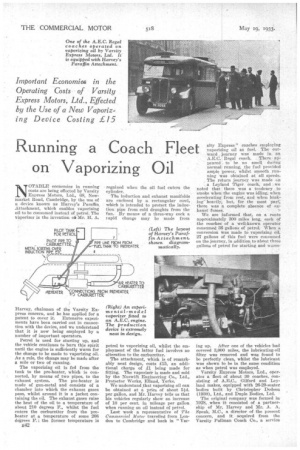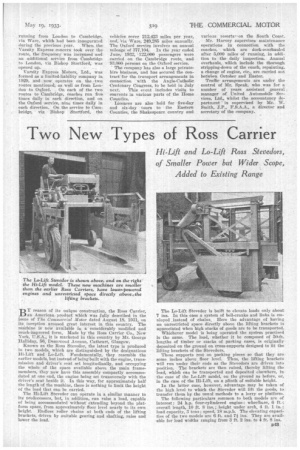Running a Coach Fleet on Vaporizing Oil
Page 56

Page 57

If you've noticed an error in this article please click here to report it so we can fix it.
NOTABLE economies in running costs are being effected by Varsity . EXPreSS Motors, Ltd., 68, Newmarket Road, Cambridge, by the use of a device known as Harvey's Paraffin Attachment, which enables vaporizing oil to be consumed instead of petrol. The vaporizer is the invention oi Mr. 171. A.
Narvey, chairman of the Varsity Express concern, and he has applied for a
patent to cover it. Extensive experiments have been carried out in connection with the device, and we understand that it is now being employed by a number of important operators.
Petrol is used for starting up, and the vehicle continues to burn this spirit until the engine is sufficiently warm for the change to be made to vaporizing oil.. As a rule, the change may be made after a mile or two of running.
The vaporizing oil is fed from the tank to the we-heater, which is connected, by means of two pipes, to the exhaust system. The pre-heater is made of gun-metal and consists of a chamber into which the exhaust gases pass, whilst around it is a jacket containing the oil. The exhaust gases raise the heat of the oil to a temperature of about 210 degrees F., whilst the fuel enters the carburetter from the prebeater at a temperature of some 208 degrees F.: the former temperature is E42 regained when the oil fuel enters the cylinder.
The induction and exhaust manifolds are enclosed by a. rectangular cowl, which is intended to protect the induction pipe from cold draughts from the fan. By means of a three-Way cock a tepid change may be made from petrol to vaporizing oil, whilst the employment of the latter fuel involves no alteration to the carburetter.
The attachment, which is of remarkably neat design, costs £15, an additional charge of £1 being made for fitting. The vaporizer is made and sold by the baiswift Engineering Co., Ltd., Protector Works, Elland, Yorks.
We understand that vaporizing oil can be obtained at a price of about per gallon, and Mr. Harvey tells us that his vehicles regularly show an increase of 10 per cent, in mileage per gallon when running on oil instead of petrol.
Last week a representative of Plie Commercial Motor travelled from London to Cambridge and back in " Var
sity Express " coaches employing vaporizing Di/ as fuel. The outward journey Was made in an A.E.C. Regal coach. ..There mipeared to be no smell, during normal running, the fuel provided aniple power, whilst smooth running was obtained at all speeds: The return journey was made on
. a Leyland Tiger coach, and we noted that there was a tendency to smoke when the engine was idling,when accelerating from rest, and when braking" heavily, but, for the most part; there was a complete absence of exhaust fumes.
We are informed that, an a • route approximately 300 miles long, each of the coaches of a well-known operatUr consumed 36 gallons of petrol. When .s. conversion was made to vaporizing Oil; 27 gallons a this fuel were consumed on the. journey, in addition to about three gallons of petrol for starting and warm
Ing up.. After one of the vehicles had covered 3,000 miles, the lubricating-oil filter was removed and was found to he perfectly clean, whilst the lubricant was shown to be in the same condition as when petrol was employed.
Varsity Express Motors, Ltd., operates a fleet of about 30 coaches, consisting of A.E.C., Gifford and Leyland makes, equiPped with 26-29-seater bodies built by Christopher Dodson (1930), Ltd., and Duple Bodies, Ltd.
The original company was formed in 1928, :when it consisted of a partnership of Mr. Harvey and Mr. A. A. Speak, M.O., a director of the present concern, and it acquired from the Varsity Pullman Coach Co., a service running from London to Cambridge, via Ware, which had been inaugurated during the previous year.. When the Varsity Express concern took over the route, the frequency was increased and an additional service from Cambridge to London, via Bishop Stortford, was opened up.
Varsity Express. Motors, Ltd., was formed as a limited-liability company in 1929, and _MOW operates on the two routes mentioned, as well as from London -to Oxford. On each of the two routes to Cambridge, Coaches run five times daily in each direction, and on the Oxford service, nine times daily in each direction. On the service to Cambridge, via Bishop Stortford, the veld-tees cover 212,423 miles. per year,
eia Were; 249,285 miles annually. The Oxford service involves an annual mileage of 377,104. In the year ended June, 1932, '422,000 passengers were carried on the Cambridge route, and 93,000 persone an the Oxford service.
The company has also a.large privatehire besieese, and has secured the contract-for the transport arrangements in connection with the Angle-Catholic Centenary Congress, to be held in July
next. This event includes visits to convents in various parts of the Home Counties,
Licenees are also held for five-day and six-day tours to the EasternCounties, the Shakespeare country and various resorts' on the south Come , Mr. Harvey supervises maintenance operations in connection with the coaches, which are dock-overhauled after 5,000 miles of running, in addition to the daily inspection. Annual overhauls, wincli include the thorough stripping-down of the coaeh, repainting, a change of engine, etc., are carried out between October and Easter.
Traffic arrangements are under the control of Mr. Speak, who was for a number of years assistant general manager of United Automobile Services, Ltd., whilst the accountancy department is eapervised by Mr. W. Smith, JP., F.S.A.A., a director and secretary of the eompauy.




























































































